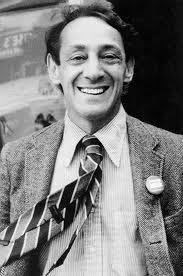The point is not whether Milk would have wanted to marry Smith. The point is that he lived in circumstances where it was possible for an openly gay and unmarried man to leave death benefits to his surviving partner.

As expected, Milk received major 2008 Oscar awards, including the one for Best Original Screenplay (Dustin Lance Black) and Best Actor (Sean Penn).
And, as I expected, the success of Milk has become, in a bizarre fashion, some kind of emblem for the continued success of the gay marriage movement.
Penn even referenced gay marriage in his acceptance speech, causing the clapping in the Kodak Theatre to increase in its intensity. Yes, Penn and his Hollywood pals were saying, this is a film that proves that gays are good, gays are worthy of our attention, and gays must have marriage if they are to ever be thought of as worthwhile human beings.
And yet, it’s bizarre that Milk’s life and career, which had little to do with the advancement of gay marriage, should now be contorted in the public realm to stand in for the ideals of the gay marriage movement. Here, I’ll stop and make a confession before moving on: I haven’t yet been able to see the film, so I’ll save a longer consideration of it for another post. But even the most cursory understanding of Milk’s career tells us that the man was a politician. He was a politician whose political interests expanded beyond gay causes even as his entrance into politics was clearly marked by a desire to live the intersection between queerness and public life in a way that had rarely seemed possible prior to his arrival.
So, it’s bizarre that Milk’s career is now being held up in its cinematic facsimile as proof for the need for gay marriage. In the process of claiming Milk as the figurehead for the modern gay marriage movement, we’ve conveniently forgotten an important historical fact, one that remains hidden to most but can be found in the pages of Nancy Polikoff’s book Beyond (Straight and Gay) Marriage: Valuing All Families under the Law. On page 8, to be exact.
Polikoff, a fellow Bilerico contributor, has this to say about what transpired after Milk’s assassination: “His surviving partner, Scott Smith, received death benefits from the state Workman’s Compensation Appeals Board.”
She continues: “When gay surviving partners of those who died on September 11, 2001, did not receive workers’ comp death benefits, gay rights advocates attributed it to marriage discrimination. But solutions to this problem and others are available or more achievable using a valuing-all-families approach, and they will help more people. Scott Smith was successful because California does not base entitlement to workers’ comp death benefits on marriage. Its law is one model other states could adopt.”
So, in other words, while a film about Harvey Milk has become an excuse to argue for gay marriage, the reality was that his own partner actually received the exact benefits that gays argue should accrue only through marriage. What gay marriage advocates want in 2009 is an erasure of the laws that granted Scott Smith death benefits. If you don’t believe me, go ahead and read the posts on civil unions that have been posted on Bilerico and elsewhere – they demonstrate nothing but contempt for anything but marriage.
But, you might ask, what if we removed marriage as the primary way to get benefits and made it possible for lots of people – unmarried people, people bound by friendship, people related to each other – to leave behind benefits, or to determine who their caretakers should be? Instead of making marriage the only way to grant benefits and health care, why not just make it just one more option among many?
Again, you’d have to read the vitriolic attacks on something as simple as civil unions to understand the blind obsession and even rage of the mainstream gay marriage movement. Nothing less than “full equality” ( a strange concept – isn’t equality enough?) will do, apparently. And those who choose not to get married can just rot in hell.
 Which brings me back to Milk. No doubt, proponents of the nothing-but-marriage-will-do-movement will argue that he would have married Smith if he had been given the chance. Maybe. Maybe not. The point is not whether Milk would have wanted to marry Smith. The point is that he lived in circumstances where it was possible for an openly gay and unmarried man to leave death benefits to his surviving partner.
Which brings me back to Milk. No doubt, proponents of the nothing-but-marriage-will-do-movement will argue that he would have married Smith if he had been given the chance. Maybe. Maybe not. The point is not whether Milk would have wanted to marry Smith. The point is that he lived in circumstances where it was possible for an openly gay and unmarried man to leave death benefits to his surviving partner.
When you think about it, that has an elegant beauty and simplicity to it and surely the principle is one that we should think of extending to everyone, gay or not. Lots of married people die leaving their benefits and estates to spouses they had grown distant from – surely we can all believe in a world where the question of who gets your stuff or your benefits ought to be intentionally determined by more than mere spousal relations. Why privilege marriage as the only relationship worthy of validation? And while we’re at it: Why make Milk’s life emblematic of a struggle that is so of our time and not his?
Originally published on The Bilerico Project, 23 February, 2009. Read comments here.